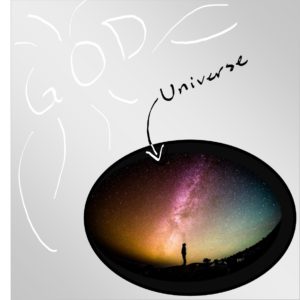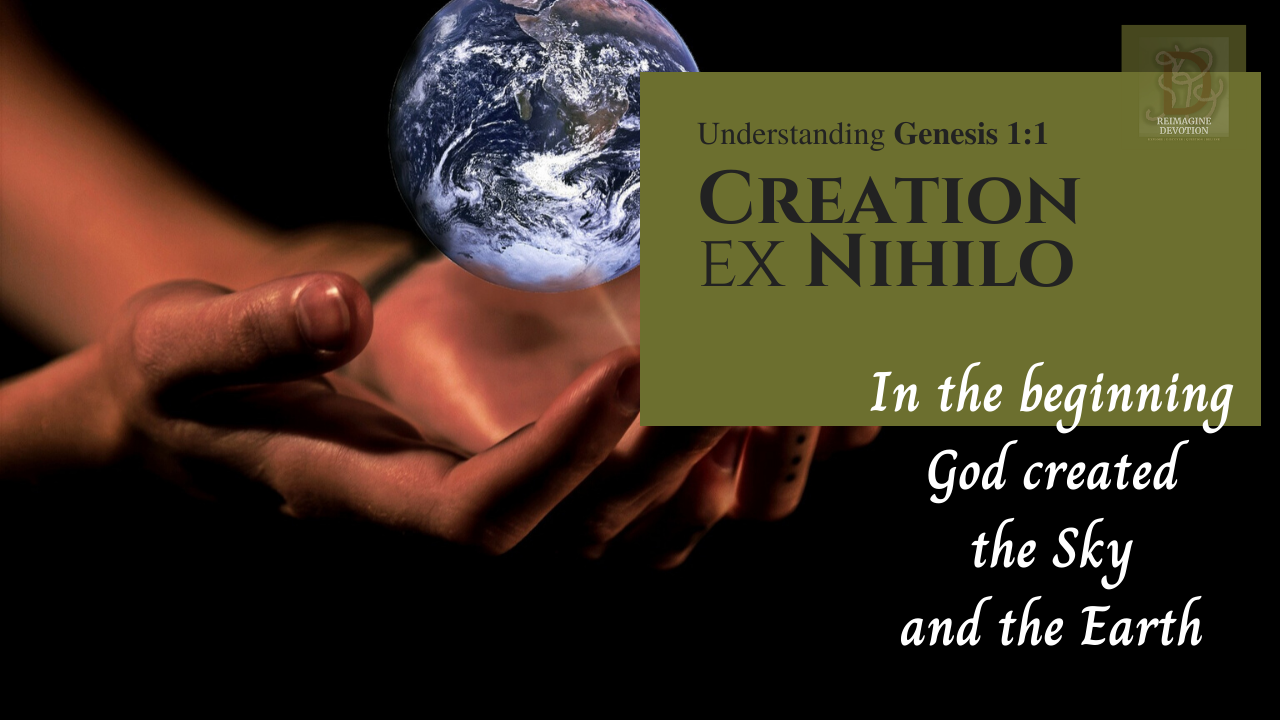The bible begins in the beginning—
The absolute and total beginning—
the time from which all time comes.
Creation ex nihilo
Long after Genesis was written, Roman Christians would start talking about something called creatio ex nihilo: creation out of nothing. While the writer of Genesis 1:1 falls short of stating that God created “out of nothing,” what he did write – in an early, less sophisticated age – already suggests what later theologians would come to know.
God created the heavens and the earth—except this isn’t exactly what the bible says. The word translated “heaven” here actually means sky. In fact, whenever you see the word “heaven” in the bible, it’s really just the word “sky.”
So, God created the skies and the earth. Ancient humans didn’t know that anything existed except the sky and the land. When they spoke of the “sky and the earth,” therefore, they were referring to the entirety of the universe. The entirety of reality.
In other words, God did not create out of “pre-existent matter.” That’s how later Christians would start saying it. Though he does not say it, the writer of Genesis 1 already anticipates the later debates. In the beginning, God created all that is.
The Line
Before this moment there was nothing. After it there was . . . something. Reality. Creation. Matter. Energy. Whatever you want to call it.
In the beginning, God created . . . In these first words, we draw a line that cannot be crossed.
It is the only real line, the only real separation in all of existence. The divisions of gender, species, plant and animal, animate and inanimate objects, even matter and energy are secondary, and ultimately insignificant. The worse divisions, between race and creed, nation and social status, are of our own making, and wholly meaningless.
But in these first words of Genesis 1:1, we find the one and only true division: God vs. creation; the Divine, and the not-divine; the created and the not created. The only line that cannot be crossed

My favorite way to describe this uses the words Uncircumscribable and Circumscribable.
Circumscribable: that which can have a circle drawn around it—that which has a beginning and an end—that which can be defined in a dictionary, or in a text book.
Uncircumscribable: that which cannot be defined, cannot be described, cannot be comprehended. That which cannot fit inside any circle, because it is beyond even the concept of the circle.
God is beyond the circle, because only from outside the circle could God create the circle—the sphere of existence—an existence that God himself is too “big” to exist inside. We can calculate the moment of the Big Bang, down to the last fraction of a second, but be cannot calculate what was before, outside, or beyond. We can only speculate. We can only dream.
Creation
Between the circle and what lies beyond the circle, there is no connection. This is the line between one reality and another. To cross it is impossible.
God is God, and we are creation. One exists forever, the other is defined by the fact that it has a beginning and an end. The sides can have nothing to do with each other, except in this one, all-precious miracle, this little action verb—to create.
We are defined not only by the fact that we begin and end, but by the fact that God began us. We are, because God was first. We are, because God is.
In this act of “creation,” the essence of existence, that we today call God, spills out into the circle, and into everything inside the circle. God’s existence spills into us, and only then do we exist. We are not God because we were created. God is not us, because God always existed. We exist, because Existence itself created us.
What about you? What does it mean to be created by God? How do you experience God as creator in your life?
Share what you’re comfortable sharing in the comment section below!
Up Next: Dive into the Deep with Genesis 1:2!


I have also thought that God could have used the Big Bang to create the universe and that way satisfy both schools of thought. It does not have to be creation or Big Bang it can be both.
Thank you for an interesting read about the first words of the Bible.
Nice to hear from you Santa H!
In seminary, I read a book – cannot remember the title unfortunately – that described (with great technical accuracy) the Big Bang in spiritual terms, putting science inside the framework of God’s might in creation. That’s when things started to come together for me on the subject. When I opened up to the possibility of Genesis 1 as symbolic, the creation story itself suddenly began to say a whole lot more to me about who God is, and mean a whole lot more to me, personally. That’s what I’m trying to do with this verse by verse Genesis study – point out the rich meaning in the symbolism these ancient writers used, and how that symbolism still has the power to change our lives today.
Cosmic theology has tried to reconcile the creation and the Creator. The cosmos is God’s perfect creativity out his outpouring of his Love. God’s self outpouring becomes matter and he breathed energy and form into the matter and set them into an unfolding process called evolution. Creation ex nihilo has been a born of contention between creationists and evolutionist. Though some evolutionist are creationist and vice versa. Creation has been a topic that has divided science and religion. God created out of nothing because he couldn’t have created from an existing being, if not he didn’t create all things. God is pre-existent and meaning he could not be confined under time and space. You rightly pointed out that this is the red line which we could not cross. The creation of form and matter could be termed anything depending on religious beliefs but there is no denying that all religions in one because of the believe in the Big Being who is the maker of all that is. God created but did not abandon his creation. He became one with his creation though he is beyond all he created.
God’s is God and creation is creation. Thanks so much for the style and creativity of this write. it is really a topic to expand.
Great to hear from you! I think you’re touching here on what I see as the primary distinction between polytheistic (which are usually animistic) religions and monotheism. The monotheistic religions, at least over the last several thousand years, typically hold a belief in God as a singular, all powerful source of all that exists. Over time, that belief evolved logically into the understanding that God must exist outside of and apart from creation. Animistic/polytheistic religions, on the other hand, place gods inside of creation, as the parents or origins or personifications of nature and the natural forces. Obviously, I’m painting with broad strokes here, but it’s an interesting distinction to think about, and an important one when it comes to understanding where the lines of thought diverge between certain religious groups.
The creation is one topic human beings will never totally comprehend on this side of eternity. The book of John speaks more on creation saying all this were made by Him. Everything was created by God, things seen and even things we cannot see. All things were created by Him and for Him! Such an unfathomable God. Thanks for this post, Shanna.
I agree Juliet, we will never understand completely, because creation is of God, and we cannot completely understand God. I love that you bring up John 1, because he was intentionally referencing the Genesis 1 creation story, but also intentionally adding to/explaining that story based on things people had learned since Genesis was written. By John’s time, people were beginning to understand the idea of Creation ex Nihilo, where they hadn’t yet understood it before. What’s fun when you study the bible is that you can see this happing, human knowledge increasing over time, causing our relationship with God to grow deeper. We will never understand these things completely, but over time, with God’s help, we can understand them better.
Hi Shanna,
When you say that “creation is of God”, do you allow for the possibility that God transformed a small portion of His infinite power into the energy/matter that has become the universe we know/inhabit?
This would not mean that the universe “is” a part of God aka pantheism, but that that which is now the universe “was” a part of God. I don’t see any theological problems here, do you? rgds, Ian.
I think this is similar to my take on it. One of my favorite early Christian writings states that God “Grudging existence to none…made all things out of nothing through His own Word,” (Athanasius, On the Incarnation of the WordAthanasius, On the Incarnation of the Word, pg. 7). The idea is that at some point, God was the only thing that existed, and God then created by, in some way sharing God’s own existence. Also, since the writing of the New Testament, Christianity has maintained that God dwells in God’s followers, and both Testaments speaks of all of nature being the ultimate witness to God’s power.
The possible theological problem is exactly the one you reference here: slipping into pantheism. Whenever we start talking about God “sharing God’s existence” or “a part of God” being in us, we do get close to that line – uncomfortably close, for some. But we can keep ourselves from slipping if we clarify where the line actually is, and more importantly why the line exists at all.
The difficulty with pantheism in Christian thought has to do with the issue of generation or cause. In short, pantheism is of the understanding that existence generates God, whereas Christian theology argues that God generates existence. In pantheism, all things are divine. In Christian theology, all things have access to divinity, and still bear the imprint of their divine creator. I like your use of verb tense to describe the distinction here, not that we are divine, but that the divine gave us a part of himself.
The most important thing to remember is that in Christian theology, God must also be separate from creationGod must also be separate from creation itself. No matter how connected we are to our creator, there is a point at which the universe’s existence ends, and God’s existence continues – Which I think is what you were getting at. This, again, is a critical distinction between Christian theology and pantheism.